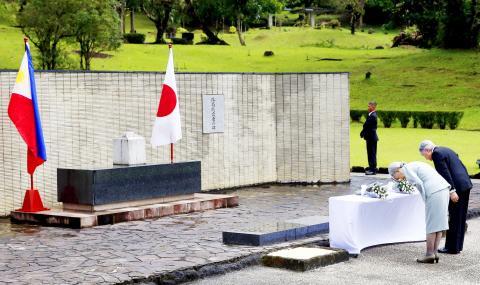With a mournful bow, Japanese Emperor Akihito yesterday paid his respects at a hilltop war memorial near Manila to the largest number of Japanese invasion troops who died outside their homeland in World War II.
Clad in black and accompanied by Empress Michiko, they each laid a bouquet of white flowers and silently prayed near a marble cenotaph in the Japanese memorial garden along Lake Caliraya in Laguna province southeast of the Philippine capital.
Some of the 170 relatives of Japanese soldiers who witnessed the somber rites wept quietly.

Photo: Reuters
Akihito did not speak at the ceremony. In his only public remarks related to Japan’s wartime aggression, he said at a state banquet hosted by Philippine President Benigno Aquino III on Wednesday that Japan should never forget the massive loss of life in the war more than 70 years ago.
“During this war, fierce battles between Japan and the United States took place on Philippine soil, resulting in the loss of many Filipino lives and leaving many Filipinos injured,” Akihito said, adding that it was something “we Japanese must never forget.”
Akihito has repeatedly expressed regret for the damage caused by the war, but has never offered a straightforward apology.
The furthest he has gone is to express “deep” remorse in an address last year marking the 70th anniversary of the end of the war.
Akihito’s visit to the Philippines this week is the latest in a series of foreign trips seen as an attempt to show his commitment to peace and remorse for World War II, when Japanese forces invaded Asian nations in a brutal conflict Japan fought in the name of his father, Hirohito.
While he has been jeered on previous foreign visits, Akihito was welcomed with full state honors in the Philippines, which now depends on Japan as a leading trading partner, a provider of development aid and a major ally as Manila confronts an assertive Beijing in contested territories in the South China Sea.

POLITICAL PRISONERS VS DEPORTEES: Venezuela’s prosecutor’s office slammed the call by El Salvador’s leader, accusing him of crimes against humanity Salvadoran President Nayib Bukele on Sunday proposed carrying out a prisoner swap with Venezuela, suggesting he would exchange Venezuelan deportees from the US his government has kept imprisoned for what he called “political prisoners” in Venezuela. In a post on X, directed at Venezuelan President Nicolas Maduro, Bukele listed off a number of family members of high-level opposition figures in Venezuela, journalists and activists detained during the South American government’s electoral crackdown last year. “The only reason they are imprisoned is for having opposed you and your electoral fraud,” he wrote to Maduro. “However, I want to propose a humanitarian agreement that

ECONOMIC WORRIES: The ruling PAP faces voters amid concerns that the city-state faces the possibility of a recession and job losses amid Washington’s tariffs Singapore yesterday finalized contestants for its general election on Saturday next week, with the ruling People’s Action Party (PAP) fielding 32 new candidates in the biggest refresh of the party that has ruled the city-state since independence in 1965. The move follows a pledge by Singaporean Prime Minister Lawrence Wong (黃循財), who took office last year and assumed the PAP leadership, to “bring in new blood, new ideas and new energy” to steer the country of 6 million people. His latest shake-up beats that of predecessors Lee Hsien Loong (李顯龍) and Goh Chok Tong (吳作棟), who replaced 24 and 11 politicians respectively

Young women standing idly around a park in Tokyo’s west suggest that a giant statue of Godzilla is not the only attraction for a record number of foreign tourists. Their faces lit by the cold glow of their phones, the women lining Okubo Park are evidence that sex tourism has developed as a dark flipside to the bustling Kabukicho nightlife district. Increasing numbers of foreign men are flocking to the area after seeing videos on social media. One of the women said that the area near Kabukicho, where Godzilla rumbles and belches smoke atop a cinema, has become a “real

Archeologists in Peru on Thursday said they found the 5,000-year-old remains of a noblewoman at the sacred city of Caral, revealing the important role played by women in the oldest center of civilization in the Americas. “What has been discovered corresponds to a woman who apparently had elevated status, an elite woman,” archeologist David Palomino said. The mummy was found in Aspero, a sacred site within the city of Caral that was a garbage dump for more than 30 years until becoming an archeological site in the 1990s. Palomino said the carefully preserved remains, dating to 3,000BC, contained skin, part of the